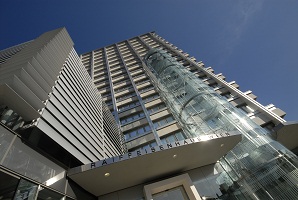RLB NÖ-Wien goes down a storm at ‘impressive’ level
Raiffeisenlandesbank Niederösterreich-Wien made an impressive debut in the benchmark covered bond market today (Tuesday), attracting more than Eu2bn of orders for a Eu500m no-grow 10 year deal that a lead syndicate banker said will be priced inside secondary levels of its peers.
Leads BayernLB, Crédit Agricole, DZ Bank, HSBC, and UniCredit will price the Austrian deal, a fundierte Bankschuldverschreibung, at 42bp over mid-swaps, the tight end of guidance of the 45bp over area that followed initial price thoughts of the high 40bps.
 More than Eu2bn of orders are said to have been placed for the transaction before the order books were reconciliated.
More than Eu2bn of orders are said to have been placed for the transaction before the order books were reconciliated.
A lead syndicate banker said that at 42bp over the deal will price well inside the secondary market bid level of the issuer’s Austrian peer Erste Bank, which had a February 2022 issue at 50bp over asset swaps bid before RLB NÖ-Wien’s transaction was announced.
“The final pricing outcome is impressive,” he said. “This deal is further evidence of the exceptional liquidity and spread situation in the covered bond market. The squeeze in the secondary market is not a mirage and investors are starving.”
A syndicate banker away from the leads said that with an order book of more than Eu2bn the deal had clearly gone very well.
The deal is the first Austrian benchmark covered bond since the beginning of May, when HYPO NOE Gruppe Bank sold a Eu500m 10 year at 88bp over mid-swaps. This was trading in the low 50s over, according to a syndicate banker away from RLB NÖ-Wien’s transaction.
Another saw RLB NÖ-Wien’s deal as coming around flat to a theoretical secondary market curve, while another said it was difficult to assess the pricing given the inaugural nature of the transaction, but that it seemed slightly punchy for where he saw comparables.
RLB NÖ-Wien had the euro benchmark covered bond market to itself this morning, against a backdrop of more activity in other new issue markets, in particular the corporate market, after what a syndicate banker said was a big rally in credit this morning.
“The market is very robust and everything is going very well,” he said “It’s unfortunate that in covered bonds we’re only getting five-handled Eu500m Germanic transactions, but it’s nice to see these getting done at nice tight levels.”
He said that major European financial institutions are focussing on the subordinated debt market rather than on funding, while corporates are looking to lock in low fixed rates at the long end of the curve.
Italy’s UniCredit and Deutsche Pfandbriefbank are out with a senior unsecured benchmarks today, however. The former was taking indications of interest for a three year on the basis of 400bp-410bp over mid-swaps. This comes after the bank on 14 August sold the first Italian benchmark covered bond in almost a year, a Eu750m no-grow that was priced at 290bp over. UniCredit Bank, a German subsidiary of the Italian banking group, yesterday sold a Eu500m maximum 10 year mortgage Pfandbrief at 22bp over mid-swaps.
RLB NÖ-Wien’s deal followed quickly on a roadshow that ended yesterday (Monday), during which it became clear, said Tim Geissler, head of treasury at RLB NÖ-Wien, that the issuer’s story – as a strong regional bank with a cover pool consisting of regional, high quality Austrian mortgage assets – was very compelling.
“I am very happy, but not at all surprised about the strong response from investors to our name and our cover pool,” he said, noting that the issuer has the best rating (A1 stable) among Austria’s non-agency banks and that it also benefitted from the support and appeal of the Raiffeisen brand.
“It took us years to get everything in place, but we will be a regular issuer in the future,” he added.
The issuer plans to henceforth issue covered bond and senior unsecured benchmarks every year, said Geissler, and has up to Eu3bn more high quality assets in its local network and on its own balance sheet in Vienna, which it will mobilise over the next two years.
[Update] Nearly 110 accounts were involved. Germany took 60%, Austria 19%, Scandinavia 10%, UK 4%, Luxembourg 3%, France 3%, and others 1%. Asset managers were allocated 30%, insurance companies 23%, banks 44%, and central banks 3%.

